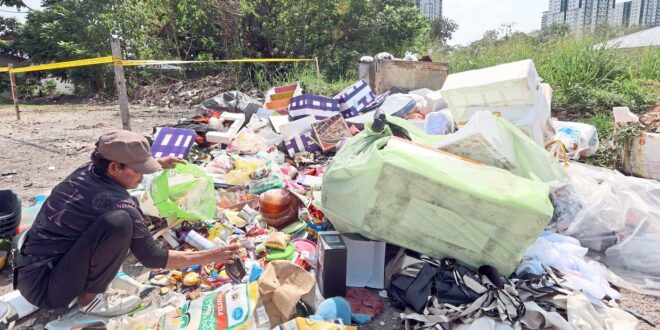THE Johor Bersih campaign is viewed as a step in the right direction to protect the environment.
However, environmental groups are calling for more serious action to be taken by Johor government, especially against those who seem unconcerned about the campaign’s efforts.
The RM250 fine for individuals caught throwing rubbish red-handed is not seen as effective because of gaps in enforcement.
Permal says the state government should impose hefty punishment like Singapore to deter littering.Malaysia Consumer Justice Association president R. Permal Ramasamy said it was high time the state government emulated the hefty punishment introduced in Singapore to discourage litterbugs.
“Since its introduction two years ago, the Johor Bersih campaign has received lukewarm response, as those who are actively doing the clean-up work are local councils and civil servants.
“There has been no massive movement among the public in advocating this agenda.
“Even today, we still see and hear about illegal dumpsites being discovered in various places; whereas in Singapore, those who are caught red-handed can be fined up to SGD1,000 (RM3,500) or even brought to court.
“Instead of issuing a RM250 fine to those caught red-handed, how about giving a RM500 reward to members of the public who catch litterbugs in action?
“This will solve any issues regarding the lack of manpower and surveillance,” he said.
Permal added that those who were caught should also be given a court order to carry out community service involving the cleaning up of their neighbourhood or other areas.
Sharing the same view was Green Earth Society Johor president P. Sivakumar, who said more NGOs and communities in housing areas should be encouraged to take part in cleanliness efforts and not just government agencies.
“Sending Southern Volunteers and SWM Environment workers is not enough; the public must be roped in to be a part of this clean-up movement.
Environmental groups are calling for harsher punishment on those caught polluting the environment such as this site at Sungai Plentong in Johor Jaya.
“I believe that there are community organisations under each local council that can be mobilised and paired with environmental NGOs.
Sivakumar says clean-ups can be promoted as another way of maintaining a healthy lifestyle.“The government should call up all environmental NGOs in the state and give them a timetable and location for the clean-up so that we can create a much more holistic and continuous approach rather than conducting seasonal clean-ups,” he said.
Sivakumar added that the Environment and Health departments could work together to promote this campaign as another way of maintaining a healthy lifestyle.
“Instead of organising a ‘5km fun run’, we can organise a fun 5km clean-up; imagine how much rubbish we can clear while at the same time, those participating can exercise and spend quality time with their families.
“The Education Department can also be mobilised by introducing environmental activities at schools.
“Each school can be turned into a centre for recycling programmes, where those living nearby can send in their recyclables.
“In the long run, this will create a good habit of protecting the environment among youths,” he added.
Malaysia Bestari Environmental Squad vice-chairman Hafizul Syarafi Mohd Noor said the Johor Bersih campaign should be more than just social media content for likes and views.
Hafizul suggests emulating Pandawara, a youth-led clean-up group in Indonesia.“The thing about philanthropic work is that it has to be organic.
“We can try emulating what Pandawara, a youth-led clean-up group in Indonesia, did, but without support from locals, it will not be a success.
“Promoting the campaign through social media would also be pointless if the public in the target area have no access to the Internet and not everyone, especially the elderly living in rural areas, has social media accounts.
“So, like it or not, we have to use the traditional method of urging village chiefs to mobilise the community and take part in the clean-up effort,” he said.
Hafizul added that the campaign should not only include the general public, but also the private sector and industries as well.
“The Sungai Kim Kim case in 2019 should be a huge lesson learned.
“Having a pollution detection system in place is a good way to prevent the incident from recurring, but it also has to report in real time so that those living, working and even studying nearby can evacuate in the event of an emergency,” he said.
Hafizul added that local councils should also place more closed-circuit television (CCTV) cameras around rivers and the main drainage system.
Chan says there are cases of industrial waste being dumped in undesignated areas.Additionally, Johor Baru City Council councillor Chan San San said there are also cases of industrial waste being dumped in undesignated areas to save on expenses that would otherwise be incurred in sending it to a landfill.
“They do not want to spend time and money going to the Seelong Sanitary Landfill in Senai, so they take the easy way out by dumping it wherever they see fit.
“Promoting environmental cleanliness is not an easy task.
“Despite ongoing campaigns and enforcement actions by Johor Solid Waste Management and Public Cleansing Corporation (SWCorp), there are still those who manage to slip through the cracks.
“There is also the issue of squatter homes, especially those that are set up right next to rivers.
“They just dump waste into the river or burn their rubbish,” she said, adding that civic awareness is important.
 BeritaKini.biz Berita Viral Terkini di Malaysia
BeritaKini.biz Berita Viral Terkini di Malaysia





